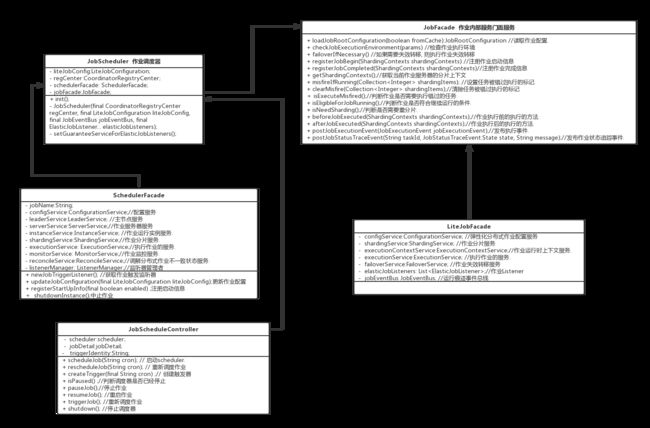开始分析elasticJob的启动过程,首先看官方example的启动实例:
//javaMain.java
// CHECKSTYLE:OFF
public static void main(final String[] args) throws IOException {
// CHECKSTYLE:ON
CoordinatorRegistryCenter regCenter = setUpRegistryCenter();
JobEventConfiguration jobEventConfig = new JobEventRdbConfiguration(null);
setUpSimpleJob(regCenter, jobEventConfig);
setUpDataflowJob(regCenter, jobEventConfig);
setUpScriptJob(regCenter, jobEventConfig);
}
private static void setUpSimpleJob(final CoordinatorRegistryCenter regCenter, final JobEventConfiguration jobEventConfig) {
JobCoreConfiguration coreConfig = JobCoreConfiguration.newBuilder("javaSimpleJob", "0/5 * * * * ?", 3).shardingItemParameters("0=Beijing,1=Shanghai,2=Guangzhou").build();
SimpleJobConfiguration simpleJobConfig = new SimpleJobConfiguration(coreConfig, JavaSimpleJob.class.getCanonicalName());
new JobScheduler(regCenter, LiteJobConfiguration.newBuilder(simpleJobConfig).build(), jobEventConfig).init();
}
private static void setUpSimpleJob(final CoordinatorRegistryCenter regCenter, final JobEventConfiguration jobEventConfig) {
JobCoreConfiguration coreConfig = JobCoreConfiguration.newBuilder("javaSimpleJob", "0/5 * * * * ?", 3).shardingItemParameters("0=Beijing,1=Shanghai,2=Guangzhou").build();
SimpleJobConfiguration simpleJobConfig = new SimpleJobConfiguration(coreConfig, JavaSimpleJob.class.getCanonicalName());
new JobScheduler(regCenter, LiteJobConfiguration.newBuilder(simpleJobConfig).build(), jobEventConfig).init();
}
private static void setUpScriptJob(final CoordinatorRegistryCenter regCenter, final JobEventConfiguration jobEventConfig) throws IOException {
JobCoreConfiguration coreConfig = JobCoreConfiguration.newBuilder("scriptElasticJob", "0/5 * * * * ?", 3).build();
ScriptJobConfiguration scriptJobConfig = new ScriptJobConfiguration(coreConfig, buildScriptCommandLine());
new JobScheduler(regCenter, LiteJobConfiguration.newBuilder(scriptJobConfig).build(), jobEventConfig).init();
}
从官方的Example代码中看,三种不同类型的作业完成基本的参数组装之后,都是交给JobScheduler这个对象的init()方法去统一初始化,那么,这个类到底在elastic-job系统中,承担着什么样的角色,一起来看一下JobScheduler对象到底做了些什么事情:
private JobScheduler(final CoordinatorRegistryCenter regCenter, final LiteJobConfiguration liteJobConfig, final JobEventBus jobEventBus, final ElasticJobListener... elasticJobListeners) {
JobRegistry.getInstance().addJobInstance(liteJobConfig.getJobName(), new JobInstance());
this.liteJobConfig = liteJobConfig;
this.regCenter = regCenter;
List elasticJobListenerList = Arrays.asList(elasticJobListeners);
setGuaranteeServiceForElasticJobListeners(regCenter, elasticJobListenerList);
schedulerFacade = new SchedulerFacade(regCenter, liteJobConfig.getJobName(), elasticJobListenerList);
jobFacade = new LiteJobFacade(regCenter, liteJobConfig.getJobName(), Arrays.asList(elasticJobListeners), jobEventBus);
}
看JobScheduler的构造方法,首先作业注册之前,会将job任务统一交由注册器JobRegistry统一管理,JobRegistry对象保存有job注册的所有信息,且从名字可以看出,该对象是单例;
看JobRegistry的API,能看到每一个job都有一个对应的job实例,和一个jobSchedulerController(作业控制器),这就和example实例中的javaMain类中的代码相互论证,setUpDataflowJob,setUpDataflowJob,setUpScriptJob中都new 了一个新的JobScheduler,而jobSchduler中new了一个新的SchedulerFacade(原来以为会和quartz的集群方案一样,共用一个Scheduler,看来是自己想错了,elasticJob中每个作业都有一个Scheduler)。 ElasticJobListener是job监控的listener,后面再单独讲,这里带过,然后组装数据。
而在官方的example中,得知,job的初始化是在JobScheduler.init()方法中,构造方法只是组装jobScheduler使用到的一些服务,和参数,那么init方法到底做了哪些事情,去启动job服务的。看代码:
public void init() {
LiteJobConfiguration liteJobConfigFromRegCenter = schedulerFacade.updateJobConfiguration(liteJobConfig);
JobRegistry.getInstance().setCurrentShardingTotalCount(liteJobConfigFromRegCenter.getJobName(), liteJobConfigFromRegCenter.getTypeConfig().getCoreConfig().getShardingTotalCount());
JobScheduleController jobScheduleController = new JobScheduleController(
createScheduler(), createJobDetail(liteJobConfigFromRegCenter.getTypeConfig().getJobClass()), liteJobConfigFromRegCenter.getJobName());
JobRegistry.getInstance().registerJob(liteJobConfigFromRegCenter.getJobName(), jobScheduleController, regCenter);
schedulerFacade.registerStartUpInfo(!liteJobConfigFromRegCenter.isDisabled());
jobScheduleController.scheduleJob(liteJobConfigFromRegCenter.getTypeConfig().getCoreConfig().getCron());
}
首先,启动的时候,会将job的配置信息通过scheduler传递给configService服务通过zk保存或更新最新的配置信息,然后将job的分片参数,jobSchdulerController注册到JobRegistry单例对象里,上面已经提到,所有的job相关的信息都是通过单例JobRegistry对象去统一管理的,registerStartUpInfo方法中通过不同的服务,做了不同服务的几件事情,启动所有的作业监听服务,选举主节点,持久化服务器上线服务,重新分片等,看代码:
public void registerStartUpInfo(final boolean enabled) {
listenerManager.startAllListeners();
leaderService.electLeader();
serverService.persistOnline(enabled);
instanceService.persistOnline();
shardingService.setReshardingFlag();
monitorService.listen();
if (!reconcileService.isRunning()) {
reconcileService.startAsync();
}
}
然后看到JobSchdulerController.scheduleJob,只看scheduleJob方法名,答案已经很明显了,在这个方法中会去启动quartz的scheduler。从init代码中初始化JobScheduleController对象得知,每初始化一个JobScheduleController,就会创建一个新的quartz的Scheduler,也就是说一个job对应一个quartz的scheduler,一个quartz的scheduler对应一个job,一一对应。
public void scheduleJob(final String cron) {
try {
if (!scheduler.checkExists(jobDetail.getKey())) {
//quartz的scheduler
scheduler.scheduleJob(jobDetail, createTrigger(cron));
}
scheduler.start(); //启动quartz的scheduler
} catch (final SchedulerException ex) {
throw new JobSystemException(ex);
}
}
看代码已经很清楚了。
总结一下启动过程中的几个对象:
JobRegistry: 保存所有job的所有相关信息。
JobScheduleController:封装quartz的接口信息,相当于ElasticJob调用quartz的API。
JobScheduler: 作业入口,所有job都要通过jobScheduler进行初始化。
最后,看一下类图
就这样,elasticJob和quartz结合在一起,从此不分离,最终执行作业LiteJob。

